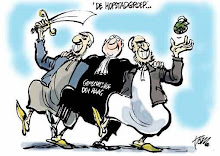Liedekerke has only 12,000 inhabitants, but its elected council has caused a stir by insisting on the “Flemish nature” of the town. Not only must all town business and schooling take place in Flemish, true throughout Flanders, but children who cannot speak the language can be prohibited from holiday outings, like hikes and swimming classes.
“België Barst!” says the graffiti on a bridge near the train station, or “Belgium Bursts!” the cry of the nationalists who want an independent Flanders. But here they also want to keep the rich French speakers from Brussels — only 13 miles away and 15 minutes by train — from buying up this pretty landscape and changing the nature of the town.
Marc Mertens, 53, is the full-time secretary of the town, a professional manager who works under the elected, but part-time, town council. Sitting in a cafe near the old church — Liedekerke is thought to mean “church on the little hill” — he describes how his grandfather fought in World War I under officers who gave commands only in French. “And then they would say in French: ‘For the Flemish, the same!’ ” The phrase still rankles, and Mr. Mertens’s grandfather, a bilingual teacher, refused an officer’s commission on principle.
Mr. Mertens, a handsome, genial man, is worried about his town.
“Brussels is coming this way,” he said, explaining that the people here, having gained some autonomy, do not want to be overwhelmed again by another French-speaking ascendancy. More schoolchildren, taught in Flemish, have French-speaking parents. “When I was young I never heard a foreign language here,” he said. “Now every day I meet people speaking French.”
Marleen Geerts, 48, a computer-science teacher of 13-year-olds, said teaching French-speakers took time. “You can’t go on with the material if they don’t understand it,” she said. “It’s a struggle.” Her school provides language tutoring.
[...]
“We don’t want Liedekerke to become like a suburb of Paris,” Mr. Daelman said, describing the riots, car burnings and attacks on the police by mostly African immigrants to France. “Big city problems are coming here, and we want to stop it.”[...]
Flemish nationalists have another complaint. Flemish are 60 percent of Belgium’s population, and inhabit the richest part, with much lower unemployment than the French-speaking Wallonia part. “The French speakers used to rule us, ” Mr. Daelman said. Now, in the national government, he added, “It’s not the principle of one man, one vote, and every problem in Belgium now becomes a problem of the communities. It’s a surrealistic spectacle, and the best answer is to divide the country.”
Full story: IHT

No comments:
Post a Comment